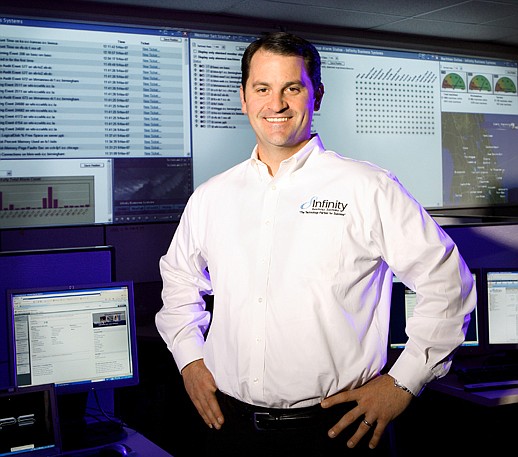- November 26, 2024
-
-
Loading

Loading

Imagine you're a computer repair company. You charge by the hour to fix machines. Wouldn't you love to live in a world full of file errors and “Unable to connect to the Internet” messages? In fact, the more problems the merrier.
Now consider that dynamic from the perspective of the business owner hiring the computer repair company, and you see an entire motivation issue in the IT industry.
That's exactly what Terry Hedden did. It's why he started Infinity Business Systems — and why his company went from $24,500 in revenue in 2003 to more than $4 million in 2008.
Hedden's focus has been on what he calls an “alignment of interests” between his IT services and his customers' needs. The result is a real life win-win scenario, where Infinity is happy when its customers are happy.
To obtain the 33% savings in technology management costs that Hedden claims to provide his customers, Infinity's new clients must undergo a four-step process to identify the proper strategy for managing their entire technology system on a long-term basis.
(That's secret number one: the all-inclusive approach to IT. Hedden says that gives clients, “one back to pat — and one throat to choke.”)
After Infinity fully understands a client's complete technological set-up, the company is able to put a plan in place that uses preventive care and network-wide efficiencies to save the customer money.
That long-term IT relationship is where Hedden's business is able to restructure the incentives for the service company.
Infinity collects revenue from its clients on a monthly, flat-rate basis. The monthly charge is dependent on factors like number of machines, size of network, and level of service.
Since Infinity's per-customer revenue is capped, it makes the company hate error messages just as much as the client — their interests are aligned.
Hedden admits that his services may not be cost-effective for every business. Companies using one computer and sending the occasional fax may not have enough problems to merit switching to a flat-rate model.
At the same time, Hedden is certain that companies with significant technology issues on a monthly basis could be saving money with his model in place, as opposed to relying on small-time, by-the-hour competitors, which he refers to as “Bill and Ted's Excellent IT Shop.”
The marketplace seems to agree so far, as Infinity's customer base and revenues have expanded rapidly since the company's inception.
Even competitors are sold on the idea. Hedden says he's on the fifth version of his company's exact business model, as rival IT firms are continually attempting to mimic Infinity's approach.
On top of that, he says he fields buyout offers “every week.”
But Hedden has no intention of selling his company. The man has goals he'd rather achieve — namely, to become a $1 billion company over the next 20 years. In that respect, his confidence is startling.
“Getting to $50 million will be easy,” he asserts.
To achieve either target, Hedden will have to focus on market penetration. In an industry dominated by one-man operations (“trunk slammers,” he calls them), Hedden says he thinks he has plurality in the market — with just 1% market share.
Infinity has offices in Tampa, Orlando, Sarasota and Atlanta, and over the next few months will “stretch” from those locations, expanding their reach as much as possible without actually installing additional offices.
On top of that, the company has enough relationships across the country to provide service for clients as far away as Minneapolis and Washington, D.C. Even though roughly 95% of customer issues can be solved remotely, the company uses those relationships to guarantee the ability to get a truck to the physical location of any client in four hours or less.
Review readers who saw our Oct. 23 Economic Forecast issue know Hedden's view on the upcoming economic recovery: he says things will never be the same. But in the meantime, he fully intends to continue making money now.
To that end, Infinity expects double-digit growth next year, likely boosted by acquisitions and, eventually, expansions.
With respect to the boom times of a few years ago, Hedden says things “won't be like that for the rest of your life.” His plan: “Make money now.”
He's off to a good start.
Infinity Business Systems growth
Year Revenue
2003 24,500
2004 500,000
2005 1,300,000
2006 1,607,000
2007 2,649,187
2008 4,080,779
2009 6,000,000*
* estimated